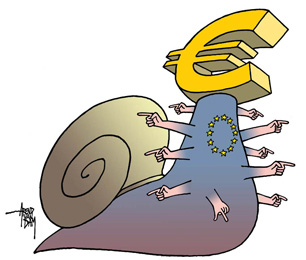Jonathan Portes, the director of Britain’s National Institute of Economic and Social Research, recently pursued an online debate with the economist Diane Coyle over the state of economics; since my name comes up both in his piece and in Ms. Coyle’s, I think I should weigh in and add some further points.
Mr. Portes was set off by Ms. Coyle’s assertion that macroeconomists have no claim to authority in this crisis, because the public despises them. As Mr. Portes points out on his blog, the reality is that macroeconomics — at least as he and I practice it — has performed spectacularly in the crisis.
In a post published on June 25, Mr. Portes quoted a three-year-old piece from Harvard professor Niall Ferguson, ridiculing me as the “man from Econ 101” who believed, foolishly, that huge government deficits could fail to raise interest rates in a depressed economy. Indeed, that is what Econ 101 said — and it has been completely right. Basic IS-LM macroeconomics (IS-LM stands for investment-savings, liquidity-money) also said that under these conditions printing lots of money would not be inflationary, and that cutting government spending sharply would cause the economy to shrink.
All of this has come true.
So Econ 101 has done just fine, and perhaps more to the point, it has made successful predictions “out of sample” — that is, about what would happen under conditions very different from normal experience. This is the sort of thing that produces paradigm shifts in the hard sciences: Light bends! Einstein is right!
So why the sense that macroeconomics is a mess? I’d say that it’s essentially political. The type of macroeconomics Mr. Portes and I do offends conservative notions of how things are supposed to work in a capitalist society, so they reject the theory no matter how well it performs, and throw their support behind other views and other people no matter how badly they get it wrong. As a result, all the public hears are arguments between dueling economists (some of them not knowing much about economics). That’s a big problem — but it’s not a problem with the economics, which has, once again, been spectacularly successful.
The other thing I’d like to say is that the notion that microeconomics is in much better shape is questionable, to say the least. I mean, it’s not as if the assumptions underlying standard microeconomics theory are, you know, true — utility maximization? Really? Micro is consistent in a way macro is not, but for the most part it’s best viewed as a metaphor that’s helpful as long as you don’t take it too seriously.
But isn’t there a lot of solid empirical work in micro? Yes — and in macro too.
The difference is that for the most part there isn’t as much politically-based determination to deny the empirical results in micro.
Yet even there, when it comes to areas where there are strong political stakes, like health care economics, you see the persistence of politically convenient views no matter how strong the contrary evidence. I originally heard the term “zombie ideas” in the health care field, not macro.
So to return to the original point: the fact is that these have been glory days for standard macroeconomics, which has done amazingly well under crisis conditions. If you’ve heard anything different, blame politics, not the economics itself.
